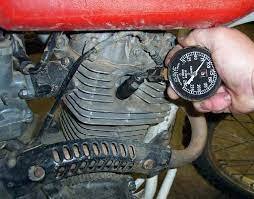
What Can Cause Loss of Compression in an Engine?
Share
What Can Cause Loss of Compression in an Engine?
When it comes to the performance of an engine, compression plays a vital role. Compression is the process of compressing the air-fuel mixture inside the engine's cylinders before ignition. It ensures proper combustion and power generation. However, there are various factors that can cause a loss of compression, resulting in decreased engine performance. Let's take a closer look at some of the common causes:
1. Worn Piston Rings
Piston rings are responsible for sealing the combustion chamber and preventing the escape of gases. Over time, these rings can wear out due to high mileage, inadequate lubrication, or poor maintenance. When the piston rings become worn or damaged, they can no longer create a tight seal, leading to compression loss.
One of the main reasons for piston ring wear is improper lubrication. The lack of proper lubrication can lead to increased friction between the rings and the cylinder walls, causing them to wear out more quickly. Regular oil changes and using the recommended oil viscosity can help prevent premature piston ring wear.
Additionally, poor maintenance practices such as infrequent air filter replacement or ignoring warning signs of engine issues can contribute to accelerated piston ring wear. It is crucial to follow the manufacturer's recommended maintenance schedule and address any engine problems promptly.
In some cases, piston ring wear may be due to manufacturing defects or poor quality materials. This is more common in older engines or engines with high mileage. If you notice a significant loss of compression, it may be necessary to replace the piston rings.
2. Damaged Cylinder Walls
The cylinder walls, also known as the cylinder liners, provide a smooth surface for the piston rings to slide against. If the cylinder walls get damaged due to overheating, inadequate lubrication, or improper maintenance, they can develop scratches, scoring, or even cracks. These imperfections can compromise the seal between the piston rings and cylinder walls, resulting in reduced compression.
Overheating is one of the primary causes of cylinder wall damage. When an engine runs too hot, the metal expands beyond its limits, causing warping or cracking of the cylinder walls. Regularly checking the coolant levels, ensuring proper coolant circulation, and addressing any cooling system issues promptly can help prevent overheating and subsequent cylinder wall damage.
Inadequate lubrication or using the wrong type of oil can also contribute to cylinder wall damage. The oil film between the piston rings and cylinder walls helps reduce friction and wear. Using the manufacturer-recommended oil and maintaining the proper oil level can help protect the cylinder walls.
In some cases, cylinder wall damage may require professional repair or even engine replacement. It is important to address any signs of cylinder wall damage, such as low compression readings or abnormal engine noises, as soon as possible.
3. Leaky Valves
The valves in an engine control the flow of air and fuel into the cylinders and the expulsion of exhaust gases. If the valves are not seating properly or are damaged, they can leak compression. Common causes of leaky valves include worn valve seals, bent valve stems, or carbon buildup on the valve seats.
Valve seals help create a tight seal between the valve stems and the valve guides. Over time, these seals can wear out, allowing oil to leak into the combustion chamber and causing compression loss. Regularly checking and replacing worn valve seals can help prevent this issue.
Bent valve stems can also cause compression loss. This can occur due to improper engine timing, high engine RPMs, or if foreign objects enter the combustion chamber. It is important to address any bent valve stems promptly to prevent further damage to the engine.
Carbon buildup on the valve seats is another common cause of leaky valves. Over time, carbon deposits can accumulate on the valve seats, preventing the valves from fully closing and creating a proper seal. Routine intake valve cleaning and using quality fuel additives can help prevent excessive carbon buildup.
4. Blown Head Gasket
The head gasket is a crucial component that seals the cylinder head to the engine block. It prevents the leakage of coolant and oil into the combustion chamber and maintains proper compression. However, if the head gasket fails due to overheating, engine stress, or poor installation, it can cause compression loss. A blown head gasket often results in symptoms like white smoke from the exhaust and coolant mixing with the oil.
Overheating is the most common cause of a blown head gasket. When the engine overheats, the extreme heat and pressure can cause the head gasket to fail. Regularly checking the cooling system, ensuring proper coolant levels, and addressing any overheating issues promptly can help prevent a blown head gasket.
Engine stress, such as prolonged high RPM operation or towing heavy loads, can also contribute to head gasket failure. It is important to follow the manufacturer's recommended guidelines for engine operation and avoid putting excessive strain on the engine.
Poor installation or using low-quality head gaskets can also lead to compression loss. When replacing a head gasket, it is crucial to use a high-quality gasket and follow the manufacturer's installation guidelines.
5. Incorrect Valve Timing
Proper valve timing is essential for the efficient operation of the engine. If the timing belt or chain that controls the opening and closing of the valves becomes worn or breaks, the valve timing can become disrupted. This can lead to poor sealing of the combustion chamber and a decrease in compression.
Regular maintenance and timely replacement of the timing belt or chain are crucial to prevent timing-related compression loss. Following the manufacturer's recommended maintenance schedule and being aware of the recommended timing belt replacement intervals can help avoid issues with valve timing.
In some cases, incorrect valve timing may be due to mechanical failures, such as a jumped timing chain or a worn camshaft. These issues may require professional inspection and repair to restore proper valve timing and compression.
Conclusion
Loss of compression in an engine can have a significant impact on its performance and fuel efficiency. It is essential to address the underlying causes of compression loss to ensure the longevity and reliability of the engine. Regular maintenance, timely repairs, and proper lubrication can help prevent or mitigate compression issues, keeping your engine running smoothly.
